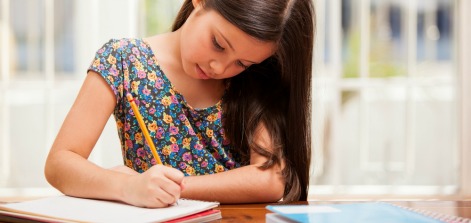Would you be happy to see your grandchildren home schooled? Author Vanessa Ronan was home schooled by her parents and maintains that it was the best, and most empowering, decision they could have taken.
Vanessa Ronan
Why home schooling is better than school
Posted on: Thu 12-May-16 14:48:23
(80 comments )
When I was little and other kids found out I was home schooled, the first thing they'd always ask was "Do you get to sleep in as late as you want?" Usually followed by the next question: "Can you go to school in your pyjamas?" Most of them were jealous I got to stay home all day. What they didn't seem to realise was, even though I was home, I was still working hard too!
My parents started home schooling my brother and me intending it only for a couple of years till we moved "someplace better". It didn't take long for us to move; in fact, we moved many times as I grew up, but we ended up home schooling all the way until college. My parents were both literature professors, so there was definitely a strong emphasis placed on our writing from a very young age. That being said though, my brother and I naturally gravitated more towards that side of our studies. Writing stories and poems was almost like a game for us, and we’d read and edit each other's work from a very young age. We lived in Patzcuaro, a colonial village in the mountains of central Mexico for two and a half years. I was nearly eight when we came back to Texas, but I remember clearly how my parents sat my brother and me down and asked us if we wanted to go to 'normal school'.
If one particular subject matter fascinated, we were allowed and encouraged to study it to the fullest of our capabilities. It is only as an adult that I have realised what a truly remarkable gift that was.
In many ways, home schooling kept learning fun. When we were little, we were given breaks throughout the day to play for 15 minutes while my mother prepared our next lesson. Or else, we would be rewarded with getting to read a storybook just for fun! We then would come back to our studies twice as attentive, excess energies exhausted, minds ready to absorb again.
Home schooling let me learn at my own pace. I started at four, completed third grade in three months, graduated high school when I had just turned sixteen. I think I would have gotten bored quite easily had I been forced to adhere to the pace and rules of a classroom at too young an age. Bullying was never really an issue for us, but, through sports and activities, we still had friends.
Of course (especially closer to college), there were government requirements of certain things we were expected to learn, certain tests we had to take, but, as we grew, by and large my parents empowered us to study what truly interested us. If one particular subject matter fascinated, we were allowed and encouraged to study it to the fullest of our capabilities. It is only as an adult that I have realised what a truly remarkable gift that was.
Our creativity was nurtured and empowered though home schooling. We were encouraged to be ourselves. We were taught to think for ourselves. And yes, sometimes we even got to go to school in our pyjamas.
Vanessa's book The Last Days of Summer is published by Penguin Ireland and is available now on Amazon.





